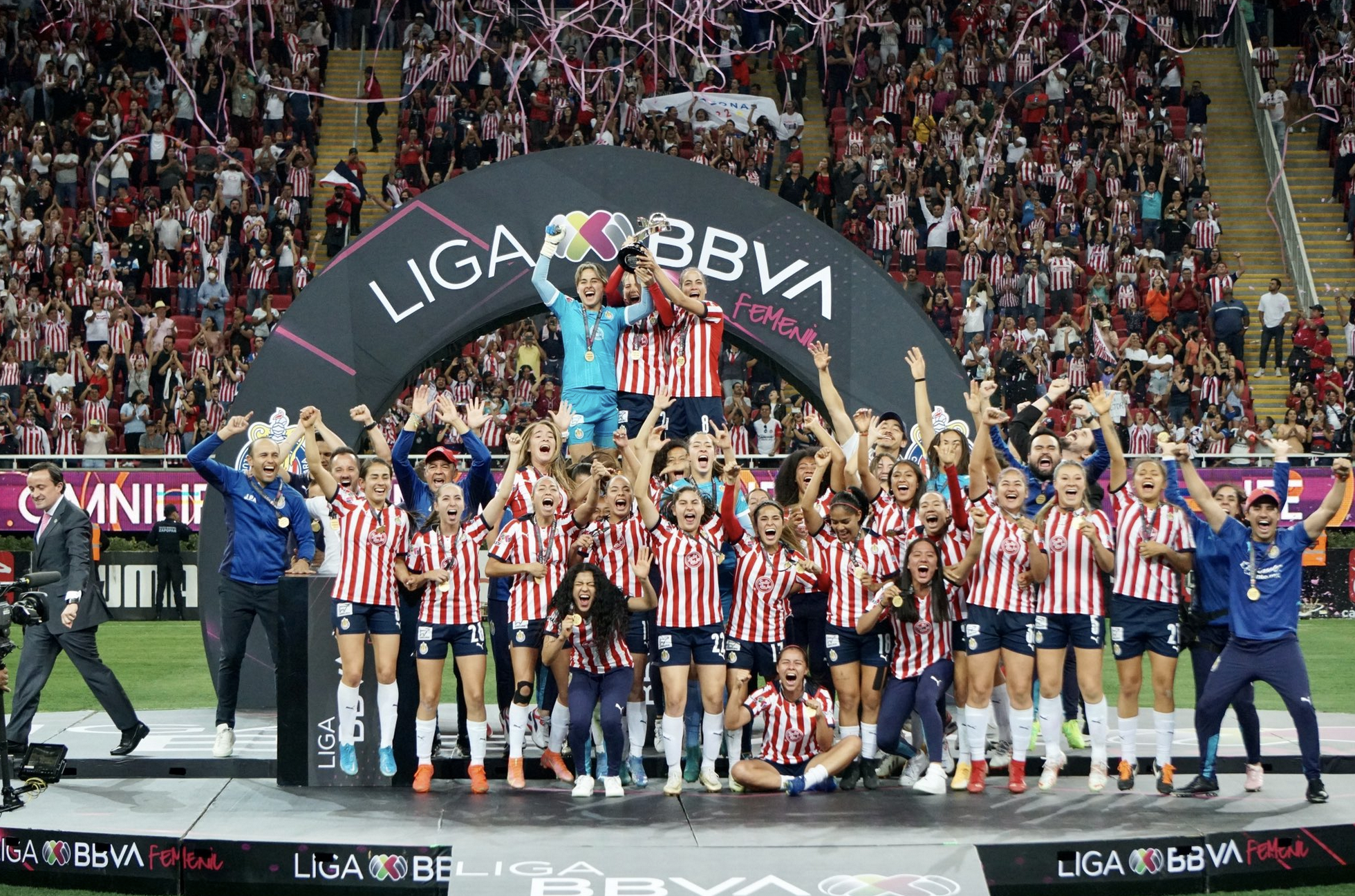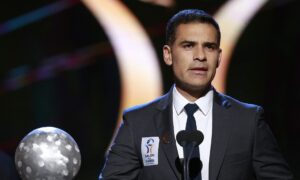Sometimes it feels like Chivas’ 2017 title is often overlooked. After all, the league’s first season had nowhere near the amount of attention and production value that we have now just five years later.
The high viewership numbers for some of the key matches in 2017 (the Clásico Nacional semifinal between Chivas and América or the final itself against Pachuca) could be attributed to simple curiosity about a sport that had previously only grown out of grassroots, amateur and often unsung efforts by people like Marbella Ibarra and Mercedes Rodríguez, among others.
The players on the winning roster back in 2017 also reportedly received a set of headphones ahead of the semifinals, and while some reports suggest they got a cash bonus, not much else is known or confirmed about the perks they received for winning the most important domestic title.
The Chivas women’s team are, from birth, the inheritors of a huge legacy, one which has been complicated to navigate at times as the institution itself continues through a rocky era under the Vergara family ownership.
There have been setbacks since the team’s inception. The coach responsible for their first, and until this week, only title, Fernando Camacho, was fired after reports surfaced of players being unfairly demoted with lower pay. After that, they suffered their worst season to date, placing eighth in the standings and failing to qualify for the knockout round under the league’s previous playoff system.
Then came Amaury Vergara and Nelly Simón. Assuming the club’s ownership after his father’s passing, Amaury has made his own mark by being heavily involved in the women’s team. One of the first steps in the three-year journey leading to Monday’s title was the hiring of Nelly Simón as Sporting Director, making Chivas the first club to appoint someone in that capacity exclusively for their women’s team. With a background in journalism, a coaching degree, and a deep knowledge of the league (having covered it since day one), Simón slowly but surely built a foundation that has culminated into a second league title.
So, how did Chivas get here?
There are some major factors, all of which have been revealing what seems to be a much larger strategy to keep Chivas competitive with financial powerhouses as Tigres, Rayadas or América.
- Chivas already tried, and failed, at the same strategy as their key competitors. Nelly Simón’s transfer windows during the first year of her tenure were splashy. The term “fichaje bomba” (bomb signing) was often thrown around the early days, bringing in national-team caliber, dual nationals such as Janelly Farías and María Sánchez. It seemed like the strategy was to beat other teams for at least some of the market’s most coveted players. Still, this ended poorly, as the first coach she appointed, Ramón Villa Zeballos, was fired due to an unspecified disciplinary issue. There was also a mass exodus, with renowned players such as María Sánchez, Janelly Farías, Norma Palafox, Nicole Pérez, and Miriam García Media wondered if such a dismantled team would be able to compete, and many predicted Chivas would fall apart and disappoint.
- From apparent disaster, a new technical direction was found. Ultimately, the players that have worked out the most for Chivas, and which have led the team into two finals and now a title, have certain common characteristics, which we could say conform this new iteration’s mold:
- Players that were more established, with not so flashy pasts, or who were considered “not good enough”. We now laud Alicia Cervantes as currently being the finest Mexican striker, and Carolina Jaramillo as one of the most talented playmakers the country has. However, upon their arrival, both were bench players from Rayadas and Tigres, reportedly due to them not being of their coach’s liking, or because of injuries. At Chivas, they found a new start, and their self-professed lifelong love for the club seems to have unlocked their full potential.
- Young and promising talent. Chivas have become forceful hub for the U20 national team, with goalkeeper Celeste Espino, center-backs Kin Guzmán and Karol Bernal, midfielder Isabella Gutiérrez, and forward Anette Vázquez in their midst. Despite their youth, all of them have plenty of experience, having played league finals and World Cup qualifiers. They’ve also become vital to provide roster depth. The newly-minted U17 tournament will provide an extra showcase for the development structures Chivas have had for years, given they had already established a youth team that funneled talent into the senior roster since the start of the league, as well as teams competing at all age groups well before that.
- Established veterans that simply needed time to improve. Blanca Félix helped Chivas lift a title by stopping a penalty kick by none other than Charlyn Corral. But at the start of the season, fans were asking for her departure, considering her done… at the ripe age of 26. Plenty of Chivas players have been around long enough that we might forget they’re actually on the younger side, and what was missing might have just been some good old-fashioned confidence boosts and the chance to hit new peaks as they matured. It took Félix a while to get back to the 2017 levels that first saw her rise as a captain and reference for the team, but she’s emerged from the physical and psychological battles just in time.
- The front office is working to ensure this strategy isn’t a novelty. Continuity is the word that best fits the team’s current project. Coach Juan Pablo Alfaro, who stepped in last-minute after a surprise exit by Edgar Mejía (who also led the team to a final a year ago), was Mejía’s assistant coach. Despite fans and media’s underwhelmed expectations, Alfaro delivered the team’s single best season to date, in which they not only won a title, but also set a new league-best defensive performance – conceding only six goals in 17 matches during the regular season. Chivas also secured a personal best in points earned (43), and Alicia ‘Licha’ Cervantes was awarded her second consecutive Golden Boot. Alfaro was able to build on his predecessor’s work while infusing the team with his own style. While not as high scoring of a team, this Chivas balanced their defense and their offense perfectly, and Alfaro showed good decision-making to fix any shaky starts during matches, taking the team’s core foundation to the next level.
With these key factors alongside a future filled with crucial contract extensions (goalkeeper Celeste Espino, defensive players Jaqueline Rodríguez, Michelle González, Damaris Godínez, Cheli Torres, as well as the full attacking trio of Licha Cervantes, Carolina Jaramillo, and Joseline Montoya have all committed to the team until 2023 and 2024), Chivas have a solid backbone they can keep adding to and that will keep them competitive for at least one more year.
And all this seems to point towards Chivas new, implicit policy: National team-level players can be made, not just bought. Save for Carolina Jaramillo, who already had national team experience, the other current three senior national team players Chivas has earned their spots purely based on their performances since arriving there: Alicia Cervantes, Joseline Montoya (who rose from open scouting to getting a few U20 looks to a consistent presence in coach Mónica Vergara’s team), and Casandra Montero (who merits an entire article focusing solely on herself). With four regularly called-up players, Chivas is slowly but surely building a bigger and better presence on the senior national team, with talent nurtured by themselves. Other notable players that could very well be the next to be called up include Jaqueline Rodríguez and Rubí Soto (who has the distinction of achieving a move to Spanish side Villarreal without ever getting a national team call, as well as being the first fully league-developed player to make an overseas move).
- This team has learned to thrive in adversity. The roster, while not being the flashiest in the league, has had a lot of potential which for some reason or another never quite panned out in the playoffs, including painful eliminations by archrivals América, and even more painful defeat in the 2021 against Tigres. But everything quite literally managed to click this season. The younger players have found their cool under pressure and the veterans anchored the team. This latest title was won by coming off deficits in both quarterfinals and semis, including pulling off a 2-0 win against Tigres. (To size up that feat, here’s a stat: Tigres had not lost a match by 2 or more goals in any of their previous 100 games. A veritable 1% chance upset).
Chivas seem to have regained that aura that had been lost since 2017, and the sense of belief was clearly felt all over their knockout rounds. One can only wonder how much of their personal pain has been an inspiration for what they’ve achieved. During the club’s broadcast of the title celebrations, Casandra Montero (who also had to go through stints at now-extinct teams such as Morelia and Veracruz during their disaffiliations), revealed that she had not hugged her mother, who was present at the final, in 22 years, as she left their home to work to provide for her and her family. Forward Gabriela Valenzuela dedicated the title to her sister, who passed away five years ago, while Coach Juan Pablo ‘Pato’ Alfaro commemorated his wife, who passed ten years ago. Damaris Godínez has also openly spoken about the challenges of balancing a professional playing career with motherhood while Licha Cervantes is now famously known for her choice to quit playing for an entire season after fighting for livable wages during her time at Atlas.
In a league that has just increased the total amount of foreign players per team from 2 to 4, and with clubs such as América, Tigres, and Monterrey opting for expensive signings of Mexican or foreign players, Chivas’ strategy stands out even more. Not just for fulfilling the club’s ethos of Mexican-only, homegrown talent, but for proving that slow and steady development can indeed win the race. Time will tell for how long, but so far, this title is a reward not just for six months of hard work, but for decisions that have been made in the past two years that have geared them in a direction that has long been overdue.
Comments







